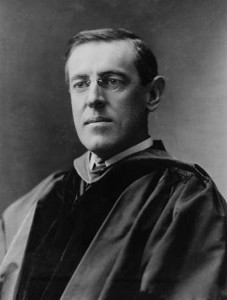Widgetized Section
Go to Admin » Appearance » Widgets » and move Gabfire Widget: Social into that MastheadOverlay zone
The Relevance of Woodrow Wilson to Egypt in 2019
The views expressed are those of the author and do not necessarily reflect the views of ASPA as an organization.
By Laila El Baradei
February 18, 2019

On teaching the first lecture in the introductory course to public administration, one has to start with Woodrow Wilson’s famous quote, “It is becoming harder to run a constitution than to frame one.” The statement rang a lot of loud bells in reference to what is currently happening in Egypt in 2019. On January 25, 2011 Egypt went through a major revolution as part of the Arab Spring movement, followed by turbulent heated debates and constitutional committees and referenda. The country settled on the 2014 Constitution. Now just five years afterwards, we wake up to the parliament presenting a call for introducing changes to the constitution.
Did Woodrow Wilson anticipate that this would happen nearly more than a century ago, when he made his famous statement in 1887 and established the beginning of the public administration discipline as a separate field of study?
During Wilson’s time, people were more engaged in political and philosophical debates than in figuring out how to run and manage government programs. That was the reason for his warning, but in today’s Egypt, it acquires a whole new additional meaning. During our attempted transition to democracy, we agreed as a nation to a number of principles and framed them clearly in the constitution. Amongst those agreed-upon principles were the following:
- To abolish the second house of parliament to save on expenses in a developing country where resources are scarce.
- To implement a quota for women’s representation in parliament as an affirmative action for one last time, and then cancel it to allow women to compete with their male counterparts on the same level field.
- To allow any president of the republic to run for two four-year terms only and not to change this article under any condition.
Now because it is easier to frame the constitution than to run it, as Wilson said, the existing parliament is choosing the easy way out. In February 2019, a formal proposal has been approved by the General Parliamentary Committee, and signed by more than 120 members out of the 596, to introduce a number of critical changes to the existing constitution. The proposal covers 15 articles and includes:
- Restoring the second house of parliament.
- Re-introducing a 25 percent quota for women in parliament.
- Alarmingly increasing the length of the two presidential terms to six years, instead of four years per term, explicitly allowing the current president to be re-elected.
The idea is that if these proposed amendments get approved by two-thirds majority of the current parliament, they will be raised to the president of the republic and a public referendum will be organized.
Some constitutional experts are warning that changing the existing 2014 constitution, which parliamentary members have sworn to respect, is in itself unconstitutional. The members of parliament have taken the following oath, “I swear by Almighty God to loyally uphold the republican system, to respect the Constitution and the law.” Additionally, according to the existing constitution, the article about the fixed two presidential terms has explicitly been pointed out as unchangeable. Article 140 states clearly that, “The President of the Republic is elected for a period of four calendar years…[and] the President may only be reelected once”. More interestingly, in a CNN televised interview in 2017, President Sisi himself stated that he has no intention of extending his stay in power beyond the designated eight years.
My humble advice to parliamentarians is to go back to lesson 1 in public administration and reflect again on Woodrow Wilson’s article. We need to concentrate more on improving government’s effectiveness and implement what we committed to in the existing constitution. The current constitution includes a lot of unmet promises and targets. We promised to allocate 3 percent of GDP to healthcare and to allocate no less than 4 percent of GDP to education. Up until fiscal years 2016 and 2017, the estimated allocations were 1.6 percent and 3.1 percent of GDP on healthcare and education respectively. We promised inclusiveness, social equity and all types of freedom, including freedom of the press, freedom of publication and freedom of research. Egypt’s ranking on the World Press Freedom Index of 2018 was 161 out of 180 countries. The constitution talked about sanctity of private life, freedom of political parties and the right to form syndicates. We are far from these targets and aspirations. The World Justice Report Rule of Law Index for 2017 and 2018 shows a dismal position of Egypt ranking 110 out of 113 nations, based on how rule of law is perceived.
Let us run the existing constitution, rather than try to frame another one and choosing the easy way out. Let us heed what Woodrow Wilson, the father of public administration stated in his seminal article in 1887. It is still very much relevant to our current times.
Author:Laila El Baradei is a Professor of Public Administration in the School of Global Affairs and Public Policy at the American University in Cairo, Egypt.


 (2 votes, average: 4.50 out of 5)
(2 votes, average: 4.50 out of 5)
Benjamin Paley
February 22, 2019 at 2:43 pm
If we don’t learn from history, we are doomed to repeat it. History has taught us, again and again, about the dangers of starting from scratch. The more responsible move would be to fix the current system through incremental chnages at the policy level; not the constitutional level. If the constitution is constantly being changed, what do the people have to rely on? There is a reason the American Constitution never really chnages: the constitution is the foundation; poliies and regulations are the building blocks.